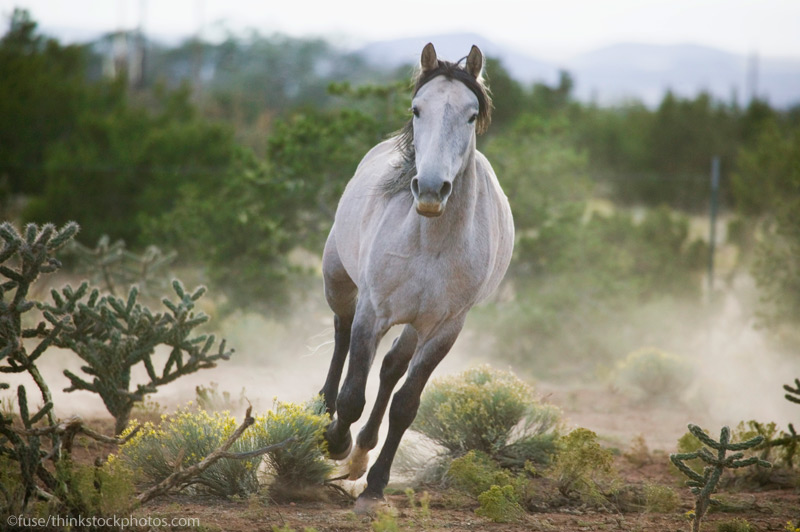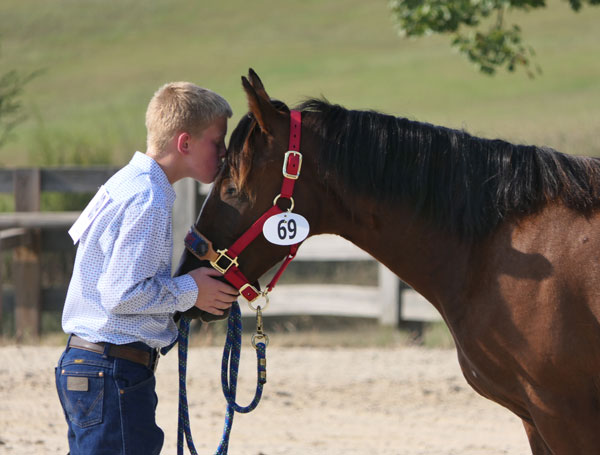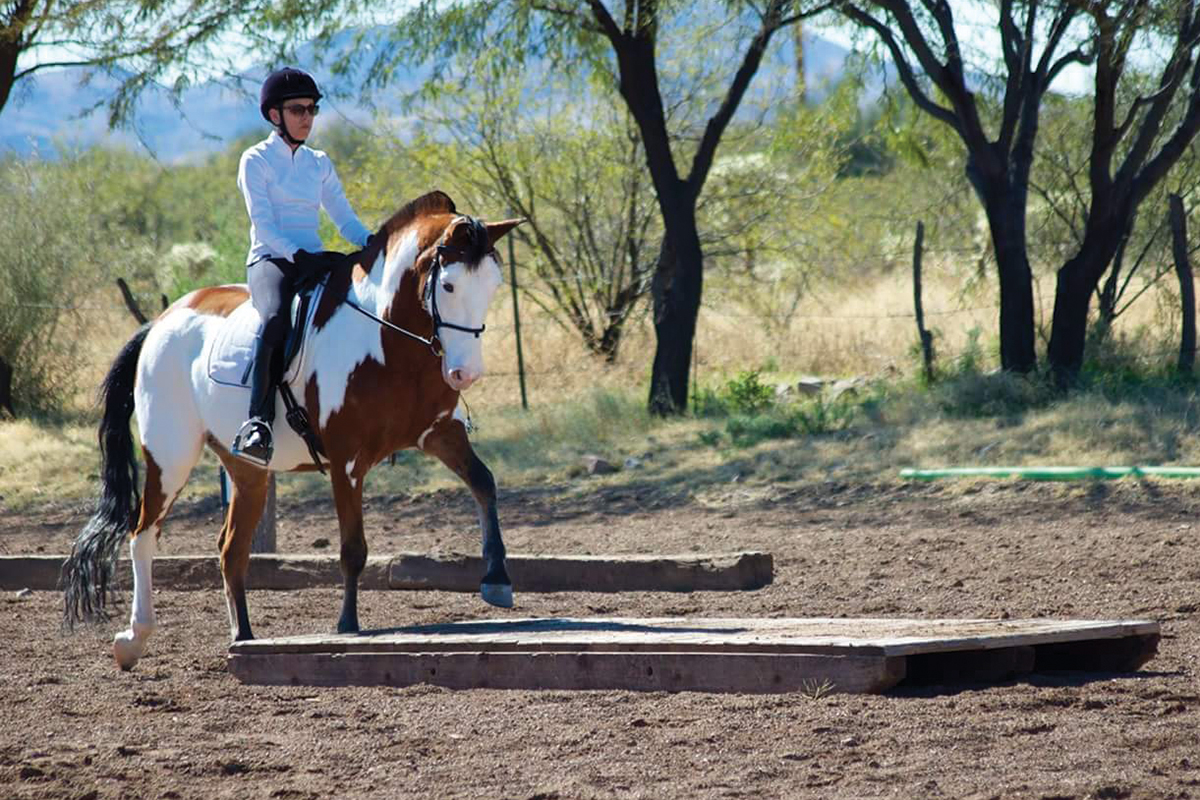
It’s the dream of many horse lovers: to have their own Mustang. And it’s no wonder. The recent popularity of programs like the Extreme Mustang Makeover has brought Mustangs into the limelight and shown what wonderful mounts they can be.
In addition to the wild horses available through the Bureau of Land Management (BLM), Mustang breeds such as the Spanish, Sulphur and Kiger are also gaining notoriety, prompting people who are looking for a unique and hardy horse to check out these special breeds.
But before you go to a BLM adoption event or buy a Mustang from a breeder, it’s important to know that Mustangs are different from other horses. BLM Mustangs grew up wild, with little or no human contact. In fact, most BLM horses have been wild for generations. Domestically bred Mustangs, like the Spanish, Sulphur or Kiger, have been domestically raised, but carry the DNA of ancestors who were wild only a few generations before.
All this adds up to a horse that sees the world differently than, say, a Quarter Horse or Thoroughbred, whose ancestors lived in close proximity with humans for centuries.
How to Train Your Mustang
“Mustangs are truly wonderful horses and are highly intelligent,” says trainer Lisa Scebbi of Diamond Elite Training in Norco, Calif., who teaches dressage to both adopted BLM wild horses and Spanish Mustangs. “The main goal with Mustangs is not to muscle them, but to outsmart them. They have a higher fight-or-flight response, due to heightened survival instincts.”
Although their strong instincts don’t make Mustangs spookier than other horses (in fact, some people find them to be less spooky), they can react strongly in situations when they feel threatened. This can result in spinning and bolting in green horses. Most Mustangs recover swiftly once they realize the threat isn’t real, and will settle down quickly.
Close to Nature
Mustangs are very sensitive to their environment, and can even be more reactive at a certain time of day.
“For instance, because of their survival instinct, Mustangs tend to be a little more sensitive at dusk,” says Scebbi. “In the wild, this is the time when predators are out.”
When Scebbi first begins training a new Mustang, she avoids working the horse around sunset.
“I want them to feel comfortable working with me,” she says. “Later in the training, once trust is established, I start working them during those hours.”
Wild Horse Intelligence
Mustangs tend to be exceptionally intelligent too, due to their wild ancestry. Horses need to learn quickly to survive in a harsh wilderness, and due to natural selection, the smartest horses were those most likely to survive. Because of this intelligence, Mustangs catch on fast in a training environment.
Frank Hopkins, a Mustang expert who lived in the 1800s and was the subject of the film Hidalgo, once wrote of the Mustang:
“You can’t beat Mustang intelligence in the entire equine race. These animals had to shift for themselves for generations. They didn’t have grooms keeping them out of trouble or trainers showing them what to do. They had to work out their own destiny or be destroyed. Some were destroyed in the working out of nature’s survival law. Those who survived were animals of superior intelligence. The Mustang knows what intelligence means.”
While this intelligence means that Mustangs learn fast, it also means they get bored easily. Constantly drilling a Mustang in a training session will result in a horse that will be less willing to work. It also means you have to be smarter than they are if you want to keep their minds occupied.
Mustang Quirks
Mustangs are also naturally curious, and often have very active mouths. They are famous for being able to untie themselves when they get tired of standing tied. They can also become destructive if they are bored, using their lips and teeth to dismantle and demolish whatever they can reach.
No doubt because of generations of herd life, Mustangs tend to be clannish. Unlike more domestic breeds, Mustangs do not consider every horse to be part of the herd. They form strong attachments to horses they live with and consider part of their family group, and can even become protective of these herd mates, not allowing other horses near them.
Mustangs, whether BLM wild horses or pure strains kept by breeders, are sensitive horses known for their ability to bond with their riders in ways not often seen in other types of horses. Once that bond is formed, a Mustang will do just about anything for you. Likewise, it can take some time for a Mustang to learn to trust you. Time spent, along with consistent, fair handling is the sure way to a Mustang’s heart.
Liked this article? Here are others you’ll enjoy:
Slideshow: Mustang Troop at the Kentucky Horse Park
Mustang Match-up
Audrey Pavia is a freelance writer and the author of Horses for Dummies. She lives with two Spanish Mustangs, Milagro and Rio.





cool
Just wondering if the author of this article has been around TBs and Arabians much. The descriptions seem to fit to a T.
I have always wanted to have a Mustang “own” me. This article is so true, but I to, see the same things in my Arabians. Galadriel, mentioned the same thing.
I am owned by 5 BLM mustangs, and have had mustangs since 1977. I’ve had many domestic breeds prior to that, including QH, Arabians, Appaloosa and other domestic breeds, but ever since mustangs came into my life, there is no better horse out there, imo.
My main soulstang, has saved my life on more than one occasion, by his own accord, once from mountain lion, and once from an attacking rescue horse.
“Demand the Brand” 🙂
This is a horribly absurd article. I’ve been involved with Mustangs via the Extreme Mustang Makeovers and Mustang Heritage Foundation adoption programs since 2008 and have trained and worked with well over 30. Every horse is an individual. I have never noticed a single horse having problems at dusk, I have never noticed them being any more mouthy as an overall group than any other breed, and in many years of horse care the quarter horses have been WAY more destructive than mustangs. This article is entirely based on one person’s stereotypes. Completely ridiculous I would think that the horse channel would produce a more well rounded article.
Temple of the Mount and Equine Paradigm
I posted this before I read the article, what a waste of timeline. (Ike who knew timelines could be wasted) Yes mustangs are very different from domestic breeds but apparently this author and trainer haven’t figured out what those differences truly are yet. To understand the mustang “mind” we need to operate from instinct, to operate from instinct we need to quit trying to “understand” anything and allow our bodies to guide us there. Then we can begin to “be” where a mustang is coming from at any moment in any situation. I’m tired of reading material from author after author, trainer after trainer, and 90% are all pure crapola. Gawd it’s enough to make a soul feel alone.
Edited · Like · More · 34 minutes ago
I once worked at a stable that owned a pure bred stallion/ mustang. It was my second day on the job at the time. They owner introduced me to the horses and after I pet every single horse as we were leaving she had said to me. ” I have owned that horse for years, no one has ever been able to get remotely close to him, let alone pet him like you have.” A few days later I was let go. Was it because the horse trusted me enough to pet him and knew I wasn’t a threat or was it something else entirely. Whatever it was I had felt extremely privileged pet this Stallion. He was a sweetheart and I could feel through my touch he trusted me.
While every horse is an individual, much of what she wrote is true of a Mustang I own ( now retired ). I got him when he was 13, he grew up living in a field with another horse ( domestic born but never trained or ridden till age 13). I adored him , and he was gentle and amazing (most of the time ). But he did become extremely reactive around dusk, and after awhile I just stopped trying to ride him at that time even handling him around that time was unsettling. Granted I am an ammie and maybe a pro could have solved it but I never could so I just rode and handled him when it was a better time. He was fabulous around other horses and very affectionate with people, nice to ride but could be extremely reactive out on trail and would hear and sense things a far distance away . I adored him but not sure if I would get another, I never could get him to do some basic things other horses did as a matter of course.
Linda G I have an 18 year old mustang that I trained at the MN Horse Training Academy in MN. He was just 2 when I brought him to school. I had no experience training or owning a horse. The teacher, Larry Surrett, had me do a lot of things differently with my mustang. He said it was very important to gain the trust of this horse, and bonding would make up for a lot of inexperience. I do find that my horse LJ was more spooky towards dusk. This article is right on. When put in the barn, LJ will flip the lights on and off if he is in the stall by the switch.
I find this article to be very insightful. I’ve been a horse person for over 50 years. I’ve had 4 domestic horses and recently got a 4 yr old well started mustang. I started w bonding time , ground work and In hand work. Now we’re starting trails. He is not at all spooky, is very aware and willing on the trail. Our first two rides were late afternoon and he did try to bolt near home. I went back to our ground work and bonding. I ride earlier in the day and no bolting near home. We have coyotes nearby and they are active at dusk. I do think there is a connection. Hs a smart boy.